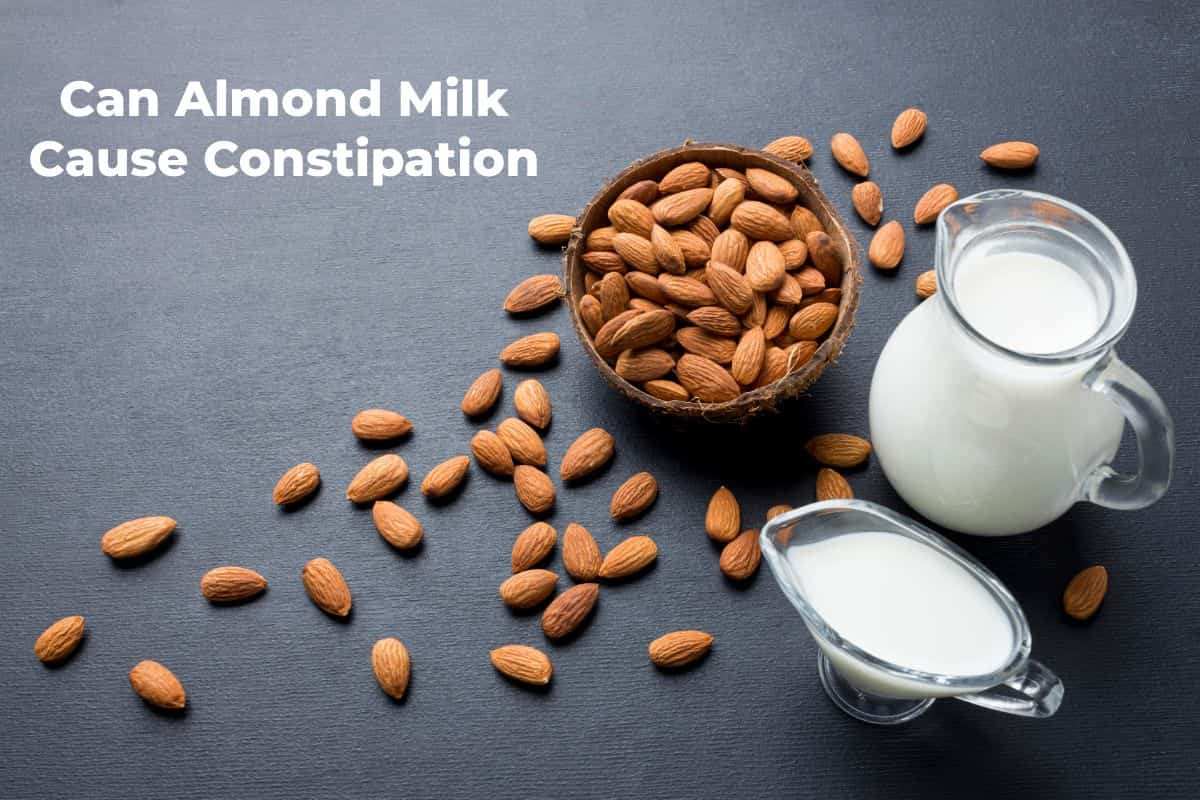Almond milk has become popular among those seeking a dairy-free beverage, including individuals with lactose intolerance, vegans, and those aiming for a lower-calorie drink. If you’ve recently switched to almond milk or are considering it, you may wonder, “Can almond milk cause constipation?” According to most dieticians, almond milk doesn’t make you constipated. However, its benefits are widely acknowledged, and many people still question its impact on digestive health. This article delves into the nutritional profile of almond milk.
What is Almond Milk?
Almond milk is created by blending almonds with water and straining the mixture to remove solid particles. This process yields a smooth, creamy liquid that is often fortified with additional nutrients. Almond milk has become a popular choice for those seeking a dairy-free alternative to traditional cow’s milk, particularly among individuals who are lactose intolerant, vegan, or looking for a lower-calorie option. Its light texture and subtle nutty flavor make it an appealing addition to various beverages and recipes.
A Detailed Nutritional Overview of Almond Milk
Here’s a closer look at almond milk’s nutritional content and implications for digestive health:
- Caloric Content: Almond milk generally contains fewer calories than traditional dairy milk, making it a popular choice for those aiming for less calorie intake. This lower caloric content can benefit weight management but does not necessarily correlate with fiber content.
- Fat and Saturated Fat: Almond milk is low in saturated fats and contains healthier fats derived from almonds. This can benefit heart health, but the low-fat content does not directly influence fiber intake.
- Vitamins and Minerals: Most commercially available almond milk is fortified with essential vitamins & minerals, including vitamin D, E, calcium, and sometimes vitamin B12. However, the natural almond content provides only trace amounts of these nutrients, and their levels can vary between brands.
- Protein Content: Almond milk has a relatively low protein content compared to dairy milk and other plant-based alternatives like soy milk. Protein is essential for various bodily functions, including muscle maintenance and repair, but it does not play a direct role in preventing constipation.
- Fiber Content: One notable aspect of almond milk is its minimal fiber content. Dietary fiber is important for digestive health, as it helps regulate bowel movements and prevents constipation. Almond milk’s low fiber content does not contribute significantly to stool bulk, an essential factor in maintaining regular bowel movements.
Can Almond Milk Cause Constipation?
The relationship between almond milk and constipation is primarily influenced by its low fiber content. Here’s a more detailed exploration of this concern:
Fiber and Constipation
Fiber is important for adding bulk to the stool & helping its passage through the digestive tract. Almond milk’s minimal fiber content does not contribute to this bulk. If almond milk is consumed excessively or as a primary source of liquid in the diet, it may result in a lower overall fiber intake, which could contribute to constipation. Inadequate fiber can lead to more complex, compact stools, making them difficult to pass and causing discomfort.
Individual Digestive Responses
Digestive responses to almond milk can vary significantly among individuals. Some people may consume almond milk without experiencing any digestive issues, while others might find it contributes to constipation if their diet lacks sufficient fiber. Factors such as individual metabolic rate, gut microbiota, and overall dietary habits play a role in determining how almond milk affects digestion. Variations in digestive health and personal tolerance to different foods mean that almond milk’s effects can differ widely from person to person.
Dietary Balance
Almond milk’s potential to cause constipation is reduced if it is part of a balanced diet that includes ample fiber from other sources. For example, incorporating fruits, vegetables, whole grains, and legumes can help ensure adequate fiber intake, mitigating the risk of constipation associated with low-fiber beverages. A diet rich in these fiber sources helps maintain regular bowel movements and offsets the low fiber content of almond milk, supporting overall digestive health.
Overall Diet and Lifestyle
Almond milk must be considered in the context of one’s entire diet and lifestyle. A diet that is otherwise high in fiber and includes sufficient hydration is less likely to experience constipation, even if almond milk is consumed regularly. Staying hydrated & engaging in regular physical activity also play crucial roles in promoting healthy digestion. Ensuring almond milk consumption is balanced with other nutrient-rich foods and a healthy lifestyle can prevent constipation and maintain digestive well-being.
The Importance of Fiber in Digestive Health
Dietary fiber plays a pivotal role in digestive health. It helps to maintain regular bowel movements, prevent constipation, and support overall gut function. Fiber can be categorized into two main types:
- Soluble Fiber: This fiber dissolves in water to form a gel-like substance. It can Asist to regulate blood sugar levels & lower cholesterol. Soluble fiber is found in oats, apples, and beans.
- Insoluble Fiber: Insoluble fiber does not disperse in water & adds bulk to the stool, facilitating its passage through the digestive tract. It is found in foods like whole grains, nuts, and vegetables.
Since almond milk is typically low in fiber, it does not contribute to the bulk of the stool. This lack of fiber can impact digestive health, mainly if almond milk is consumed in large amounts or as a significant component of the diet without sufficient fiber from other sources.
Factors Contributing to Constipation Beyond Almond Milk
Constipation is a multifaceted issue influenced by various factors beyond the consumption of almond milk. Understanding these factors can help in managing & preventing constipation effectively:
- Inadequate Fiber Intake: A diet low in fiber is a primary contributor to constipation. While almond milk’s low fiber content is a factor, assessing overall fiber intake from other dietary sources is crucial. Ensuring a high-fiber diet is essential for maintaining regular bowel movements.
- Dehydration: Insufficient fluid intake can lead to harder stools and difficulty in bowel movements. Drinking water throughout the day is vital for maintaining stool softness and preventing constipation.
- Lack of Physical Activity: Regular physical activity encourages the digestive system & promotes regular bowel movements. A sedentary lifestyle can contribute to constipation & other digestive issues.
- Dietary Imbalances: Relying heavily on low-fiber foods, including almond milk, without incorporating fiber-rich foods can disrupt digestive health. Maintaining a balanced diet with diverse food choices supports overall gut health.
Strategies for Preventing Constipation While Enjoying Almond Milk
If you enjoy almond milk but are concerned about its potential impact on digestion, consider these strategies to support digestive health:
- Increase Fiber Intake: Ensure that your diet includes a variety of fiber-rich foods like fruits, vegetables, whole grains & legumes. This helps offset almond milk’s low fiber content and supports healthy digestion.
- Stay Hydrated: Drink ample water all through the day to support proper digestion & prevent constipation. Adequate hydration helps keep stools soft and facilitates their passage through the digestive tract.
- Incorporate Whole Almonds: Consuming whole almonds or almond-based snacks can provide additional fiber, contributing to overall dietary fiber intake and supporting digestive health.
- Engage in Regular Exercise: Incorporate physical activity into your routine to stimulate digestion and promote regular bowel movements. Activities such as walking, jogging, or yoga can be beneficial for maintaining digestive health.
- Monitor Almond Milk Intake: Almond milk affects digestion. If you experience constipation or other digestive issues, consider adjusting your almond milk consumption and evaluating your diet for balance.
Exploring Alternatives to Almond Milk
If almond milk raises concerns about constipation, consider exploring other plant-based milk options that offer higher fiber content:
- Oat Milk: Oat milk is a good original of soluble fiber, which can help maintain digestive health and prevent constipation. It often has a creamier texture and can be a suitable substitute for those concerned about fiber intake.
- Soy Milk: Soy milk generally contains more protein and is often fortified with additional fiber, making it a better choice for those seeking to support digestive health.
- Hemp Milk: Hemp milk provides some dietary fiber & essential fatty acids, which can contribute to digestive health and overall well-being.
Conclusion
While almond milk is not typically a direct cause of constipation, its low fiber content can contribute if it forms a significant portion of the diet without adequate fiber intake from other sources. To prevent constipation and support digestive health, it is impotant to maintain a balanced diet rich in fiber, stay hydrated, and engage in regular physical activity. If digestive concerns persist, consulting a healthcare professional or a registered nutritionist can provide personalized guidance and support.
Frequently Asked Questions (FAQ)
Almond milk can be part of a healthy diet, but if you have constipation, it’s important to balance it with fiber-rich foods. Incorporate fruits, vegetables, whole grains, and legumes to ensure adequate fiber intake.
Almond milk is low in calories, saturated fat, and can be fortified with essential nutrients like vitamins D and E, calcium, and sometimes vitamin B12. It’s a suitable dairy alternative for those with lactose intolerance or on a vegan diet.
Almond milk itself does not directly affect bowel movements, but its low fiber content may contribute to digestive issues if it’s a major part of your diet and not balanced with fiber-rich foods.
Not necessarily. Almond milk can be enjoyed as part of a balanced diet. The key is to ensure that you’re consuming enough fiber from other sources to maintain digestive health.
Almond milk has a low fiber content, which means it doesn’t add bulk to the stool. If consumed in large amounts without sufficient fiber from other sources, it may potentially impact digestion and contribute to constipation.

















